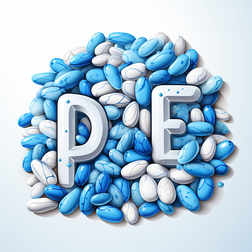Can anxiety cause erectile dysfunction?
- Introduction to Anxiety and Erectile Dysfunction (ED)
- Performance Anxiety and Concerns about Pleasing a Partner
- High Cortisol Levels and Inhibited Testosterone
- Anxiety Disorders and their Relationship with ED
- The Vicious Cycle of Anxiety and ED
- The Impact of Stress and Mental Health Conditions on ED
- Treatments for ED: Medical and Lifestyle Approaches
- Blood Flow Changes and Erection Difficulties
- Brain Signaling and the Body's Physical Response to Anxiety
- The Importance of Addressing Sexual Anxiety and Psychological Counseling

Introduction to Anxiety and Erectile Dysfunction (ED)
Anxiety and erectile dysfunction (ED) are two common conditions that can sometimes intersect in a person's life. Anxiety is a mental health condition characterized by persistent worry and fear, often about everyday situations. Erectile dysfunction, on the other hand, refers to the inability to achieve or maintain an erection for sexual intercourse. The relationship between these two conditions is more complex than it might first appear.
Performance Anxiety and Concerns about Pleasing a Partner
One common trigger for ED is performance anxiety. This form of anxiety stems from a man's concern about his ability to satisfy his partner sexually. This worry can lead to a cycle of anxiety and ED, where the fear of dysfunction can heighten anxiety, which in turn can further contribute to ED. A man may feel pressure to perform, causing stress and possibly leading to erectile problems.
High Cortisol Levels and Inhibited Testosterone
Anxiety can lead to increased cortisol levels in the body. Cortisol, known as the stress hormone, can inhibit the production of testosterone, the male sex hormone primarily responsible for sex drive and erectile function. Over time, chronic anxiety can lead to persistently high cortisol levels, potentially leading to a decrease in testosterone levels and subsequently contributing to ED.
Anxiety Disorders and their Relationship with ED
There are various types of anxiety disorders, including generalized anxiety disorder, panic disorder, and social anxiety disorder. Each of these conditions can indirectly contribute to the development of ED. The constant state of worry or fear characteristic of these disorders can cause significant stress, which may, in turn, affect a man's sexual function.
The Vicious Cycle of Anxiety and ED
The relationship between anxiety and ED can become a vicious cycle. Anxiety can lead to erectile difficulties, and the experience of ED can cause further anxiety. For some men, this cycle can become a persistent problem, resulting in ongoing sexual dysfunction. It's essential to break this cycle to effectively manage both anxiety and ED.
The Impact of Stress and Mental Health Conditions on ED
Stress and other mental health conditions like depression can exacerbate the effects of anxiety, potentially leading to more severe cases of ED. Chronic stress can contribute to hormonal imbalances that affect sexual function. Mental health conditions can also cause feelings of worthlessness or guilt, which can heighten performance anxiety and exacerbate ED symptoms.
Treatments for ED: Medical and Lifestyle Approaches
There are various treatments available for ED, both medical and lifestyle-oriented. Medical treatments often include prescription medications, like sildenafil (Viagra), that can help improve blood flow to the penis. However, these medications might not address the underlying issues if ED is primarily caused by anxiety. In such cases, psychological counseling, specifically sexual anxiety counseling, might be more beneficial.
Lifestyle treatments for ED often focus on improving overall health. Maintaining a healthy weight, limiting alcohol use, and avoiding tobacco can all help improve erectile function. Regular exercise can also boost testosterone levels, improve mood, and reduce stress, thereby improving both mental health and sexual function.
Blood Flow Changes and Erection Difficulties
Blood flow changes are a significant physical factor that contributes to ED. Anxiety can trigger the body's fight-or-flight response, redirecting blood flow away from the penis, making it difficult to achieve or maintain an erection. Therefore, while anxiety can cause erectile problems indirectly through cortisol and testosterone interactions, it can also cause direct physical changes that lead to ED.
Brain Signaling and the Body's Physical Response to Anxiety
Anxiety also impacts brain signaling and can interrupt the signals sent to the penis to allow for an erection. In times of stress and anxiety, the brain may prioritize signals related to danger or stress over those related to sexual arousal. This can cause difficulty in achieving or maintaining an erection, contributing to ED.
The Importance of Addressing Sexual Anxiety and Psychological Counseling
Addressing sexual anxiety is a crucial part of managing anxiety-induced ED.
Psychological counseling can help individuals address and manage their worries about sexual performance. This form of counseling can also help break the vicious cycle of anxiety and ED by reducing performance anxiety and promoting healthier sexual attitudes.
In conclusion, anxiety can indeed cause erectile dysfunction. The impact of stress and anxiety on hormones, brain signaling, and blood flow can all contribute to this condition. However, it's essential to remember that help is available, and this condition is manageable. Consulting with a doctor and seeking psychological counseling can significantly aid in overcoming ED caused by anxiety.
To answer the related questions, anxiety medications can potentially help with ED if it's primarily caused by anxiety. However, the first line of treatment for ED caused by anxiety is often psychological counseling. It's also crucial to manage stress and adopt healthier lifestyle habits to improve overall health and sexual function. Ultimately, consulting a doctor is essential in effectively managing ED. They can guide you through possible treatments and help you understand your symptoms better.



